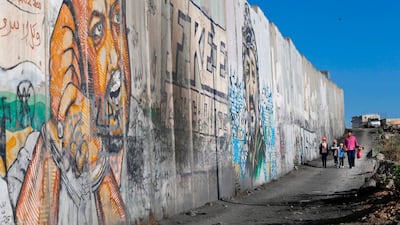When Israel passed a new counter-terrorism law last year, Ayman Odeh, a leader of the country’s large minority of Palestinian citizens, described its draconian measures as colonialism’s “last gasp”.
The panic and cruelty plumbed new depths last week, when Israeli officials launched a $2.3 million lawsuit against the family of Fadi Qanbar, who crashed a truck into soldiers in Jerusalem in January, killing four. He was shot dead at the scene.
The suit demands that his widow, Tahani, and her young children reimburse the state for the compensation it awarded the soldiers’ families.
Like other families of Palestinians who commit attacks, the Qanbars are homeless, after Israel sealed their East Jerusalem home with cement. Twelve relatives were also stripped of their residency papers as a prelude to expelling them to the West Bank.
None has done anything wrong – their crime is simply to be related to someone Israel defines as a “terrorist”.
This trend is intensifying. Israel has demanded that the Palestinian Authority stop paying a small monthly stipend to families like the Qanbars, whose breadwinner was killed or jailed. Conviction rates among Palestinians in Israel’s military legal system stand at more than 99 per cent.
Israeli legislation is set to seize $280 million from taxes Israel collects on behalf of the Palestinian Authority, potentially bankrupting it.
On Wednesday Israel loyalists will introduce in the US Senate a bill to similarly deny the PA aid unless it stops “funding terror”. Issa Karaka, a Palestinian official, said it would be impossible for the PA to comply: “Almost every other household … is the family of a prisoner or martyr.”
Israel has taken collective punishment to new extremes. It argues that a potential attacker can only be dissuaded by knowing his loved ones will suffer harsh retribution. Or put another way, Israel is prepared to use any means to crush the motivation of Palestinians to resist its brutal occupation.
All evidence, however, indicates that when people reach breaking-point, and are willing to die in the fight against their oppressors, they give little thought to the consequences for their families. That was the conclusion of an investigation by the Israeli army more than a decade ago.
In truth, Israel knows its policy is futile. It is not deterring attacks, but instead engaging in complex displacement activity. Ever-more sadistic forms of revenge shore up a collective and historic sense of Jewish victimhood while deflecting Israelis’ attention from the reality that their country is a brutal colonial settler state.
If that verdict seems harsh, consider a newly published study into the effects on operators of using drones to carry out extrajudicial executions, in which civilians are often killed as “collateral damage”.
A US survey found pilots who remotely fly drones soon develop symptoms of post-traumatic stress from inflicting so much death and destruction.The Israeli army replicated the study after its pilots operated drones over Gaza during Israel’s 2014 attack. Some 500 Palestinian children were killed as the tiny enclave was bombarded for nearly two months.
Doctors were surprised, however, that the pilots showed no signs of depression or anxiety. The researchers speculate that Israeli pilots may feel more justified in their actions, because they are closer to Gaza than US pilots are to Afghanistan, Iraq or Yemen. They are more confident that they are the ones under threat.
The determination to maintain this exclusive self-image as the victim leads to outrageous double standards.
Last week the Israeli supreme court backed the refusal by officials to seal up the homes of three Jews who kidnapped Mohammed Abu Khdeir in 2014 and burnt him alive.
In May the Israeli government revealed that it had denied compensation to six-year-old Ahmed Dawabsheh, the badly scarred, sole survivor of an arson attack by Jewish extremists two years ago.
This endless heaping of insult upon injury for Palestinians is possible only because the west has indulged Israel’s wallowing in victimhood so long. It is time to prick this bubble of self-delusion and remind Israel that it, not the Palestinians, is the oppressor.


